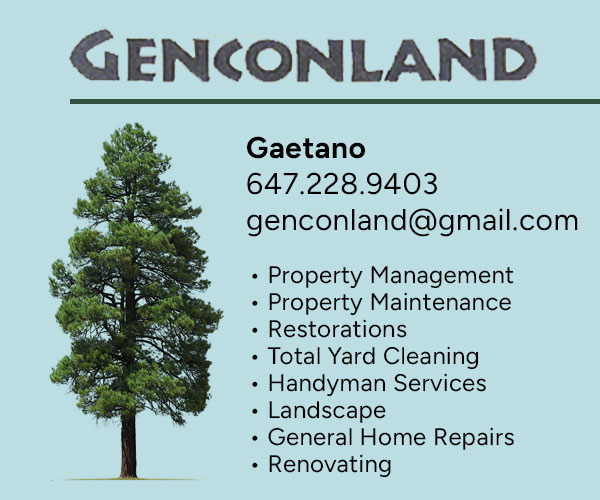Food for thought about residential development – and the economic future – of Southern Georgian Bay
stories by Janet Lees
New home development in Southern Georgian Bay is facing challenging times, partly due to higher development costs and longer wait times for municipal approvals, and partly due to the lack of a coordinated effort to promote economic development throughout the region.
On The Bay interviewed Andrew Hill, president of the Georgian Triangle Development Institute (GTDI), a private sector, non-profit organization that represents the development sector within the Southern Georgian Bay region. Members include planners, developers, engineers, construction companies, real estate firms, and related businesses and interested parties throughout the area.
Hill offered fascinating insights into the challenges facing not only developers, but our entire region. Following is an excerpt of our interview.
OTB: Developments in the area were hit hard by the 2008 recession. What is the current state of the market?
AH: Certainly the recession put a grinding halt to things because demand had fallen off and lenders had stopped lending. Those conditions have improved, there’s no question, so development is returning. We’re optimistic. The economy is stronger now and I think it will continue to be healthy, but development has slowed, especially in the Town of Blue Mountains. It’s forcing out smaller developers, the time to get approvals has been too long, and the cost of development has risen, so new development is slower than it should be.
Statistics in terms of the number of new homes being built show that the numbers have fallen over the last few years, and they should be rising. The resale market is strong, but the new development market is weaker, and that is because of the cost of new development and the lack of an effective economic development strategy raising the profile of the region.
OTB: What are some of the trends you’re seeing in new home development in the area?
AH: Certainly there has been a recent trend to new community developments like Creekside and like Georgian Meadows, which are more neighbourhood residential communities, and I think that’s serving an entry price point and a family price point, which is good to see in the Southern Georgian Bay region.
I think there’s a continued focus on recreational lifestyle development like we’ve seen in the Town of Blue Mountains and along the waterfront, and that continues because people are looking for a recreational lifestyle, so there are golf communities, there are communities near the ski hills, there are developments near the water, there are retirement-focused communities, there’s lock-and-go. Lock-and-go condominium developments are very strong because people are looking for that kind of lifestyle. There is also a trend towards smaller lots, smaller homes, bungalows, townhomes and the like, and there are a number of reasons for that type of development. One is certainly price point; another is size – downsizing – and another is people wanting to have more living space on the main floor or ground floor.
Another reason that drives it, which you might not be aware of, is the higher cost of new development – higher development fees, higher development levies, higher costs of servicing, and quite a long time to get approvals. All of those things are driving the cost of new development up, so that also increases the requirement for higher density.
The main challenge that faces developers in this region is the high cost of implementing municipal standards, development charges, and all of those things go into the cost of the home for the end user, so instead of being able to build estate lot subdivisions that we used to see in developments like Monterra, now we’re seeing smaller lot development like Windstone, because the numbers don’t work for the larger lots.
OTB: Is that why we’re seeing higher-density residential developments?
AH: Yes. The province of Ontario has been pushing for higher density and more effective use of infrastructure. The cost of infrastructure – water, sewer, roads – is going up, and higher density pays for that more effectively. So higher denstity is being put into development planning guidelines from the province, which trickles down to the county level and then to the municipal level.
That again is a challenge in this region because, is that what the buyer wants? Yes, I think there’s a demand for that, but I don’t think it meets all of the customers’ wants and needs. That’s a challenge in this community because not everyone is looking for a home in a small-lot subdivision.
You can do townhouses, small lot residential, stacked condominiums, large lot residential – essentially a mixed-use residential development plan. You get mixed density, and I think that’s probably a good solution. This is the knowledge we have so far, but we’re looking to update that knowledge with the help of the real estate association.
OTB: How is GTDI working with the real estate association?
AH: The Southern Georgian Bay Association of Realtors is conducting some surveys right now to ask their membership about what is missing in the market and what are the new trends in the market, so we’re going to be getting that data in the next few weeks. They will be making a presentation to our membership about that, and the GTDI is also holding a real estate forum in May where we’ll be discussing what the future holds.
It’s interesting that a lot of the realtor community is not typically involved in the sales of new development – sometimes they are, but often the developer has their own sales and marketing team – but it’s the realtor community that looks after resales of that product, so they quickly become familiar with new development product, and the pluses and minuses – the good things and bad things about it. So it’s that type of feedback that the Georgian Triangle Development Institute is looking to get. The realtors see the entire marketplace, so that’s why we want to work with them.
OTB: What kinds of lobbying and advocacy work is the GTDI involved in?
AH: In our discussions with developers in our region, the high cost of development and the length of time to obtain approvals – particularly in the Town of Blue Mountains – is pushing the smaller developers out of this market because they don’t have the deeper pockets that can pay for this high cost of development, they don’t have the strength to wait out the long time for approvals. So our organization has been working with the Town of Blue Mountains, and the Town of Blue Mountains has undertaken an initiative to improve their development approval process, which obviously we support. It’s a good thing they’re doing because they recognize that it’s a challenge for them.
Our organization has also been very active in advocating for stronger economic development strategies in the Southern Georgian Bay region, and those strategies need to be directly tied to development planning policies as well.
OTB: What are the economic development issues the GTDI is trying to address?
AH: This area has so many great assets and strengths and people want to live here, but we feel that the area municipalities are not doing enough to leverage the assets of the region and to increase the economic profile of our region.
We have been lobbying for a number of years to push the area municipalities for a stronger regional economic development strategy working together.
We’ve held economic development forums in the past and we’re holding another one in October. Small business is really the backbone of the economy here. Most employers are 50 employees and under. We have a number of professional firms in the area – in the engineering and planning, legal and banking professions, for example – and they’re having trouble getting qualified employees.
The qualified employees down in the Greater Toronto Area don’t understand the lifestyle this area offers – many people still think of this region as a ski area, and they don’t understand that this is really Ontario’s only four-season destination recreational area. It’s that type of ‘profile’ marketing and messaging that needs to get out in a more effective way through the municipal economic development efforts. If you’re an engineer working in the Greater Toronto region, you’re not thinking of Collingwood as an option for you to live and work in because you’ve already got a $100,000 a year down there, but they don’t realize that they could come up here and have a vastly improved lifestyle and still get good work.
OTB: What would you say to people who argue they don’t want to see more development, and would like to see our area continue to be a well-kept secret?
AH: All the more reason for a well-thought-out economic development strategy that is tied to development policies. If you work these details out and it’s tied to public input, then the result is future development that is tied to the desires of the public rather than just the municipalities coming up with an official plan. That’s why our organization has been advocating for a well-thought-out plan – and a strategy to implement it – that’s developed from public input and in conjunction with the other municipalities in the region, focusing on South Georgian Bay. In the past, Collingwood has had its own economic development office, Town of Blue Mountains has its own, Wasaga has its own, with very little success and effort – “oh, we don’t have the budget for that.” But thankfully in the last election, economic development became a major platform for all of the area municipalities, and they’re focusing on it again. We were arguing that they were missing opportunities. It’s a great area, so let’s seize opportunities, but let’s seize the right opportunities.
OTB: So the GTDI is advocating taking a regional approach to economic development as opposed to more narrowly focused efforts by each municipality?
AH: It’s the only way. We’re competing now on a much larger scale. Everyone is. We’re no longer just a bunch of local communities. We’re competing provincially, we’re competing nationally, we’re competing globally. People can go anywhere now.
The first step is communication. That wasn’t happening, and now it’s starting to happen. We’re learning that we have to take it in baby steps. In our last economic development forum that we had a year and a half ago, we brought in other regional economic development corporations and organizations from around Ontario to show Collingwood, Blue Mountains and Wasaga how they do it. They’re listening, but I’m not expecting instant results.
OTB: For a reader who is interested in buying a new home, how does all of this impact or trickle down to what they’re going to be looking at, what the options are going to be for them, what the pricing is going to be, etc.?
AH: Hopefully what it means is that they’re going to get the product that they want rather than having to settle for something that isn’t what they want. If the development community can produce products that are in demand, they’re going to get a better price for it, it’s going to sell faster, and there will be less risk of having empty, undeveloped sites. Developers do not do things unless there’s a profit involved. Nobody does. This is a business.
There’s no question in our mind that a strong economic development strategy is going to help the prosperity of the region and thus allow new developments to be more successful because people will want to be here, and it will be more targeted at the type of development we want to have in the region. We are not Barrie, so we shouldn’t be developing that product.
OTB: Have you been involved with our region’s new think tank, the Institute of Southern Georgian Bay?
AH: Yes, we’ve been involved with Don May (president of the ISGB). We talked to them about economic development and they said that’s an area they would just allow the Georgian Triangle Development Institute to lead the advocacy on, because that’s been our area of focus for probably the last 10 years. I’m pleased to say that finally the area municipalities have taken notice and have started to focus on it. ❧
















